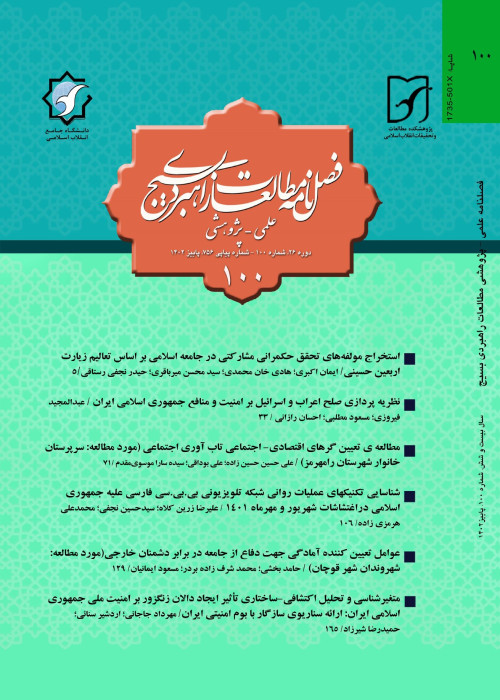Phenomenology of Policy in the Course of Tabligh Jamaat
Author(s):
Abstract:
Since the failure of Muslims in 1857 AD against Great Britain colonialism, as well as other factors such as ‘’ the fall of Ottoman Caliphate”, “Sufi superstitions and innovations”, and “British harassment”, the conflict between Muslims and Hindus intensified. By the same token, with the creation of interactive activities a war entitled “Tabligh” was formed in order to strengthen the cohesion and vigor of defense among Muslims. The movement worked against two fronts of Evangelicals and Hindus. The Tablighi Jamaat led by Mohammad Ilyas Kandhalvy, a Sunni Hanafi scholar and traditionalist belonged to the theological school of Matridiyah. The movement was looking for change and inspired by an ideology, utilized the mystical way, organized a new experience of power technology which includes: Law enforcement, the self-commanding and self-organizing institutions. The religious thought of the movement is contrary to their claims and mixed with politics. Their political process comprises proximity to power with use of simple tools and techniques like mosque, free manpower and personal expenses. Tablighi Jamaat is the most influential and comprehensive contemporary Islamic movement in the Indian subcontinent and neighboring countries. The movement began from a region near Delhi and gradually spread all over India and later subcontinent and other countries. This study seeks to answer the following question: Does policy in Tablighi Jamaat movement apply to third world countries that have an incomplete state-nation building process? To answer this question, we can say that in third world countries the state-nation building process is influenced by competition and religious relations. Thus the Jamaat hardware dimensions such as group structures and establishment of centers and related organizations show more advancement. Particularly after “Septemeber 11th, 2011” events, due to cross-border communications and join with crisis-maker countries in international security and more than other reasons, religious competition root in internal structure and external factors. Some other cases stem from illusion of mind.
Keywords:
Phenomenology , Policy , Movement , Jamaat , Amir , Tablighi Jamaat , Matridiyeh
Language:
Persian
Published:
Journal of Basij Strategic Studies, Volume:17 Issue: 63, 2014
Page:
137
magiran.com/p1425350
دانلود و مطالعه متن این مقاله با یکی از روشهای زیر امکان پذیر است:
اشتراک شخصی
با عضویت و پرداخت آنلاین حق اشتراک یکساله به مبلغ 1,390,000ريال میتوانید 70 عنوان مطلب دانلود کنید!
اشتراک سازمانی
به کتابخانه دانشگاه یا محل کار خود پیشنهاد کنید تا اشتراک سازمانی این پایگاه را برای دسترسی نامحدود همه کاربران به متن مطالب تهیه نمایند!
توجه!
- حق عضویت دریافتی صرف حمایت از نشریات عضو و نگهداری، تکمیل و توسعه مگیران میشود.
- پرداخت حق اشتراک و دانلود مقالات اجازه بازنشر آن در سایر رسانههای چاپی و دیجیتال را به کاربر نمیدهد.
In order to view content subscription is required
Personal subscription
Subscribe magiran.com for 70 € euros via PayPal and download 70 articles during a year.
Organization subscription
Please contact us to subscribe your university or library for unlimited access!


